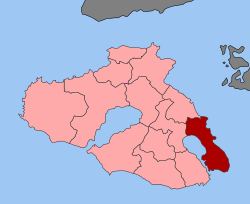Mitylene
|
Mytilene Μυτιλήνη |
||
|---|---|---|

View of Mytilene.
|
||
|
||
| Coordinates: 39°6′N 26°33′E / 39.100°N 26.550°ECoordinates: 39°6′N 26°33′E / 39.100°N 26.550°E | ||
| Country | Greece | |
| Administrative region | North Aegean | |
| Regional unit | Lesbos | |
| Municipality | Mytilene | |
| • Municipal unit | 107.46 km2 (41.49 sq mi) | |
| Elevation | 8 m (26 ft) | |
| Population (2011) | ||
| • Municipal unit | 37,890 | |
| • Municipal unit density | 350/km2 (910/sq mi) | |
| Community | ||
| • Population | 29,656 (2011) | |
| Time zone | EET (UTC+2) | |
| • Summer (DST) | EEST (UTC+3) | |
| Postal code | 811 00 | |
| Area code(s) | 22510 | |
| Vehicle registration | MY | |
| Website | www.mytilene.gr | |
Mytilene (Greek: Μυτιλήνη Mytilini [mitiˈlini]) is an ancient city founded in the 11th century BC. Mytilene is the capital and port of the island of Lesbos and also the capital of the North Aegean Region. The seat of governor of the North Aegean Region is Mytilene. Mytilene is also one of 13 municipalities (counties) on the island of Lesbos. Mytilene is built on the southeast edge of the island. It is also the seat of a metropolitan bishop of the Orthodox church.
As an ancient city, lying off the east coast, Mytilene was initially confined to a small island just offshore that later was joined to Lesbos, creating a north and south harbor. According to the writings of Homer, the island of Lesvos has been an organized city since 1054 B.C. The early harbor of Mytilene was united during ancient times with a channel 700 meters long and 30 meters wide. The Roman writer Longus speaks of white stone bridges linking the two sides. The Greek word Εύριπο or Euripus is a commonly used term when referring to a strait. The strait allowed ancient sail boats called Triremes, with 3 tiers of rowers or more. The boats that passed were ca. 6 metres wide plus oars and had depth of 2 meters.
The areas of the city that were densely populated connected the two bodies of land with marble bridges. They usually followed a curved line. The strait begin at the old market called Apano Skala. It was also close to Metropolis Street and ended at the Southern Harbor. One could argue that the channel transversed what is now called Ermoy Street. Over time the strait began to collect silt and earth. There was also human intervention for the protection of the Castle of Mytilene. The strait eventually filled with earth.
Mytilene contested successfully with Methymna in the north of the island for the leadership of the island in the 7th century BC and became the centre of the island’s prosperous eastern hinterland. Her most famous citizens were the poets Sappho and Alcaeus and the statesman Pittacus (one of the Seven Sages of ancient Greece). The city was famed for its great output of electrum coins struck from the late 6th through mid-4th centuries BC. Mytilene revolted against Athens in 428 BC but was overcome by an Athenian expeditionary force. The Athenian public assembly voted to massacre all the men of the city and to sell the women and children into slavery but changed its mind the next day. A fast trireme sailed the 186 nautical miles (344 km) in less than a day and brought the decision to cancel the massacre.
...
Wikipedia



